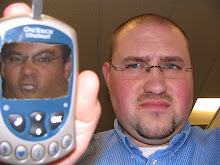I have been using/wearing an insulin pump for somewhere between 8-10 years (I can't keep track of when I started). It is my opinion that the pump may be the best tool available for tight control of diabetes.
Of course, the pump is not for everyone, and it is not a "magic bullet" that will automatically cure all of your problems, nor will it automatically bless you with the tightest control you've ever had.
It usually takes a lot of work when starting a pump to figure out the ideal settings for you, so you have to be up to the task if you decide pumping is for you.
From my point of view (read, regular guy, NOT a doctor), the pump offers these PROS:
- Incredible flexibility (no snacking to match peak times of long acting insulin)
- The ability to deliver insulin in more precise and possibly smaller increments (beneficial for those who don't require much insulin or for small children)
- The ability to have multiple basal rates throughout the day (I require a higher basal rate during the morning hours than for the rest of the day)
- It's always with me (I don't have to carry around vials & syringes)
- It's more private & discrete for bolusing in public (again, no vials & syringes)
- I can manipulate my basal rate up for sick days if necessary
- I can manipulate my basal rate down for exercise, for which I'd otherwise need to eat to match my long acting insulin
- Fewer "pokes" or injections. With a pump I only need to do an injection 2-3 times per week to change my infusion set, rather than 4-5+ shots per DAY.
- You really learn how you & your diabetes works.
- When used to it's fullest benefit, and with limited external stimuli, you can achieve incredibly tight control.
The pump offers some drawbacks as well:
- Increased risk of
DKA. This is because there is no long acting insulin being used. If for any reason the supply of insulin (usually humalog or novolog) is interrupted you do not have the long acting insulin on board, and may go into DKA much faster.
- The "Pump & Munch" factor. Because you now have this wonderful insulin pump, you no longer need to take an extra shot to eat those treats - it's a simple matter of a push of a button or two. That extra shot might have been enough pain & inconvenience for you to pass on those treats. If you are not mindfull of this, you might gain some unwanted weight.
- Infusion site problems. Some people have problems with reactions and irritation to some to the tapes used with infusion sets.
- Frequent blood sugar monitoring is required. Ok, this one is questionable, because I think all diabetics need to be very aware of their blood sugar levels at all times. But, the point here is that you can head off problems if you diagnose them early (by frequent checking!).
- Troubleshooting skills are necessary. When things are going a little weird, you have to be able to figure out where the problem is, and whether it's related to the pump or not.
With all that being said, I subscribe to pump therapy 100%. I truly feel that using an insulin pump has given me the most flexibility of lifestyle and is the best tool for the job. As with many things in life, "
your mileage may vary".


